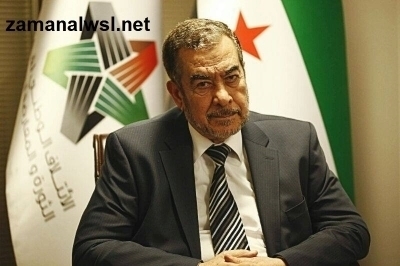Deputy leader of the opposition Syrian National Coalition and Comptroller General of Syria’s Muslim Brotherhood has said the United States policy in Syria disappoints the Syrian people, not only in terms of military support.
In special interview with Zaman al-Wasl, Mohammad Farouq Tayfour said that at the beginning of the Syrian revolution the Brotherhood believed that the American support would be beneficial because the revolution’s aims were in line with the principles of human rights.
“However, unfortunately, the American support was little and more restricted while the Russian and Iranian support is unlimited to Assad’s regime,” Tayfour said.
The chemical deal with Russia immediately revealed “another face of the U.S.”, he said.
“When Barak Obama left the Syrian crisis to Russian, even they described Bashar Assad’s agreement to deliver the chemical weapon as appositive sign, ignoring his brutality and the crimes committed against the Syrian people to go on without punishment.”
Tayfour said Robert Ford, the American ambassador who is responsible for the Syria file had explained that the U.S. aimed to achieve balance between the opposition and Syrian regime before the American election in 2012. He said the U.S. was worried about the opposition’s ability to overthrow the regime any time before election, according to Tayfour.
Tayfour called on the international community for support and help from Friends of Syria to provide aid and support to people in need, as the Assad regime is now adopting a starvation policy to punish the Syrian people.
Unfortunately, he said, the Coalition and most the charitable and humanitarian organizations cannot afford more that 10% of people’s needs, he added.
He stressed that as the main opposition group, the Coalition has done its best to break the heavy siege especially in Ghouta and Homs, and demanded the international community establish safe corridors to deliver essential needs for people under siege.
Regarding the Islamic State in Iraq and Greater Syria, the Muslim Brotherhood leader said: “We try to avoid any clashes or engagement between ISIS and the Free Syrian Army, and the FSA has reached agreements with ISIS in many areas. We hope it would stop any invasion and control of liberated areas, as ISIS entered Raqqa and Azaz after they were liberated already.”
The first priority, he said, is to unify all forces to overthrow the regime and afterward they would start building a civil country.
Tayfour said he considered it too soon to deal with ISIS as a state that aims to separate from Syria, and he thought that constitution and governmental institution can enforce law, not by the power of arms. Tayfour said he holds the Syrian regime responsible for any extremism or sectarian struggle, either in Lebanon or Syria, and even in Iraq.
Regarding whether a new Syrian state would be Islamic or not, Tayfour said he considered implementing Islam’s rules by force unacceptable, adding that the future government and its institutions would be responsible for applying laws and the constitution.
He stressed that Muslim Brotherhood in Syria is an example of moderate Islam and he does not feel that the difficulties experienced in Egypt could affect Syria, despite the fact that events in Egypt affect all the Arab World.
Whatever happens in Syria, he said, “it is not a civil war, as the western media allege,” adding that the best evidence to contradict this claim is the Coalition itself “which was founded upon a unity of sects and ethnicities.”
Translated and edited by the Syrian Observer
......


